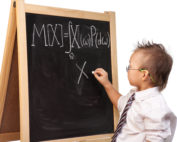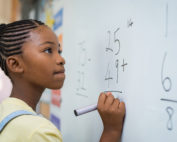What is Learnership?
Learnership combines the words and meanings of the words “learner” and “ownership.” Together, they embody the elevation of learning to learner ownership. Someone who has true learnership is one who self-directs, self-evaluates, self-reflects, and self-controls their own learning. We are posting new articles every week so make it your routine to check-in frequently. Or, subscribe to The Learnership Review and receive monthly emails so you never miss a thing.
Teaching Kids to Think Like Mathematicians
In this article you will learn:
- Providing students with questions to foster metacognition helps them expand their thinking, develop metacognitive skills, and become more aware of their own strengths and weaknesses.
- The Questions to Foster Metacognition can be thought of as “what teachers should be asking”—or, more accurately, ideas teachers can use to support students’ metacognition in grade appropriate ways. These questions should be modeled by the teacher and then gradually handed over to the students themselves.
- It is imperative that we teach our students to think like mathematicians by asking questions that foster metacognition and teach them to speak like mathematicians when making ownership statements that demonstrate that they are actively integrating both cognitive and metacognitive skills, both mathematical content and mathematical practice.
The Mathematical Practices Are the Metacognition Our Kids Need
In this article you will learn:
- Mathematical metacognition in the classroom is essential for the development of problem-solving skills.
- Fostering metacognition requires a balance of explicit instruction, teacher modeling, student-centered exploration, and responsive coaching. This approach helps students initially learn the types of questions and thought processes they can apply, enabling them to progressively use these skills autonomously.
- Mathematics instruction must simultaneously develop conceptual understanding, computational fluency, and problem-solving skills and teaching the Standards for Mathematical Practice can support this development.
How Teachers Can Prioritize Their Many, Many Decisions
In this article you will learn...
- The key role of the teacher is to design and deliver effective and efficient lessons for all students based on the best practices regarding curriculum, instruction, assessment, and the climate and culture of the classroom, be it a physical, a virtual, or a blended learning environment.
- For every lesson, the teacher must prioritize and make these decisions–What will my students learn? Why are they learning this? How will they continue to use it? How will my students learn it? How will my students show that they have learned it? What is the student’s role in the learning?
- Each decision will impact other decisions and it is the teacher’s job to decide how these four areas of curriculum, instruction, assessment, and climate work together to ensure that there is the highest likelihood of a student learning.
How to Proactively Plan for Any Learning Environment
In this article, you will learn...
- The benefits of proactive planning for any learning environment.
- The phases of the learning process.
- How to leverage the phases of the learning process when planning and teaching to empower students in their learning.
What’s the Buzz About Student Agency?
In this article you will learn...
- The benefits of student agency are student motivation and engagement and empowers students to take initiative and greater control in their learning.
- Utilizing student agency provides students with the opportunities to own their learning.
- Teachers play a critical role in equipping students with the knowledge and skills they need to be successful agents in their learning.
The Evolving Role of Educators – A Shift in Educational Leadership
In this article you will learn...
- The demands of the 21st century marketplace necessitates transforming schools, and teacher leadership is an essential component for meeting the current needs of students and the future needs of the global community.
- The development of the skills students and educators need is a big project which requires a team of stakeholders who can support one another in their learning.
- Educators need professional learning opportunities to build leadership skills, to practice what they have learned, and to collaborate and learn from each other.
What are people saying about Elevated Achievement Group?
Relevant and valuable information that we can put into practice.
Can you imagine building an environment full of motivated, engaged, and eager students who own their learning?
We can.









